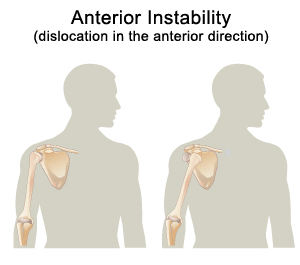Shoulder Instability / Dislocation
Shoulder instability occurs when the shoulder moves completely out of its socket (dislocation) and requires a medical professional to “relocate it”, or to a lesser degree, when it slips out of joint but spontaneously move back in place (subluxation). Usually, the shoulder dislocates or subluxes forward (this is called an anterior dislocation). Much less often, it dislocates backward (posterior dislocation), and sometimes, it can slip out forward, backward, or downward (this is called multidirectional instability). Remember, you may have an “unstable” shoulder that has not completely dislocated.

Dislocation of the shoulder typically occurs from falling onto an outstretched arm or a blow to the side or back of the shoulder when falling on it. This can happen in different sports activities or falls. Dislocations are managed medically to relocate the head of the humerus bone. Depending on the severity of the dislocation, your physician will typically prescribe physical therapy to help stabilize the shoulder joint and protect it during a recovery phase.
With frequent dislocations, the shoulder can become unstable as many structures in the shoulder get damaged and become too lax. By strengthening the muscles around the shoulder, stability can be increased in the shoulder, preventing future dislocations.
At times, dislocations can be quite severe and lead to tearing of cartilage, tendons, ligaments or muscles. In this case, surgery is often needed. After surgery physical therapy is an important part of recovery and returning to normal activities.
How physical therapy helps
Physical therapy is very important after a dislocation. Our physical therapists work with you closely to protect the joint while it heals, teach you how to take care of your injury and gently rehabilitate your shoulder. During the healing phase, your shoulder will be protected and pain will be addressed.
Per your physician's protocol we will gradually increase your range of motion, maintaining your joint stability. Further into therapy, gentle strengthening is performed to improve the muscle support around the shoulder. Ideally, full range of motion and strength is recovered allowing you to return to normal activities and with the knowledge to protect your shoulder from further injury.
Hours of Operation
Monday 7:00 - 5:00
Tuesday 7:00 - 12:00
Wednesday By Appointment Only
Thursday 7:00 - 5:00
Friday 7:00 - 12:00
Contact Us Today
570-726-0331
Allow us to help you "Achieve Your Goals"! Give us a call today to schedule an appointment!
Contact Info
© 2019 Chappell Physical Therapy. All rights reserved | Marketing by Mid-Atlantic Marketing Group